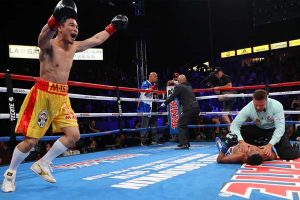The Regicide: On Srisaket Sor Rungvisai
By Jimmy Tobin-

He was the opponent that night in March, if not quite in the derogatory sense, where matchmaking calculus eliminates a fighter’s prospects in advance, then at least in terms of billing. He was supposed to fall, by knockout ideally, to play his role in a narrative no less true for it being dressed in the bombast of a network’s company men. But he left the ring a champion.
When super flyweight Srisaket Sor Rungvisai won a majority decision over Roman Gonzalez at Madison Square Garden he did more than play an earnest part in a fight near perfect in its brutality. More? Remarkably, yes, though we should stay there with the sweat, the blood, the attrition for a minute, no?
Unlike any number of Gonzalez’ previous opponents, who found themselves trapped in the line of fire against the finest offensive fighter in the sport, Rungvisai stood irreverently at arms reach. Bolstered by a size advantage that thwarted Gonzalez time and again, and what seemed a fortifying concoction of ignorance and disregard for the man before him, Sor Rungvisai welcomed the fight Gonzalez promised like no opponent has. He brought foul after disruptive foul, drawing first blood via a headbutt and doggedly persisting in his rough work until the seemingly unflappable Gonzalez looked tellingly to the referee for order.
And we should thank him for his belligerence. Because what he demanded of Gonzalez that night was nothing short of self-immolation. And Gonzalez responded. To watch “Chocolatito” in those championship rounds, drained of his blood from headbutts, his zest leaking out with it, chopping his blade dull against a man he could not fell, was to witness the type of performance only great fighters can manage—and even then only once or twice. Sor Rungvisai’s appreciation for that assault, his finding even some joy in all that leather, was awe-inspiring. Gonzalez was his greatest that March night; Sor Rungvisai was the reason he had to be.
Not to be lost in the debate about who deserved to win is the reality that Sor Rungvisai fought a great fighter on near even terms, and that barring some absurd veneration of the undefeated record, what the fighters produced that night trumped easily any assessment of that action by the judges. We do not watch (and rewatch) fights simply to see who wins—we watch to marvel at the journey to that result. The outcome is always secondary to the violence that produced it.
He was the opponent that night in September too, if only until the man he defeated six months prior began his ring walk wearing an uncharacteristically grim visage; until the thirteenth round between them started with the irreverence of the first, and the sixteenth ended unforgettably.
When Srisaket Sor Rungvisai augered Roman Gonzalez into the canvas in the fourth round of their rematch at StubHub Center in Carson, California, he ratified not only his career but that too of Gonzalez, who ended up where his ambition would inevitably lead him—at a point absent of questions either unasked or unanswered. What more could be asked of Sor Rungvisai, for that matter? Come September, the sabers that rattled in protest of the decision in March were as silent as Gonzalez on the canvas. Sor Rungvisai was twice the underdog against Gonzalez and twice emerged with victories. Surely fighters have bucked the odds this way before, but how many of them did so against a fighter like Gonzalez? Were the two to fight again, Sor Rungvisai would be the clear favorite—and the reasons for those odds are why Gonzalez is unlikely to ever consummate the trilogy.
HBO was validated that night as well, if not in the way they intended. And they took note too. In a span of eleven months, Sor Rungvisai will go from twice facing Gonzalez to fighting Juan Francisco Estrada, who, until this year, had given Gonzalez his sternest test, with all three fights televised by HBO.
For too long the pattern has been in place: fighter X is maneuvered by various means into HBO’s interest, he wins a showcase fight or two on the network, is dramatized into a protagonist, and then matched according to the outcome of a script, one that mostly preserves his image lest HBO itself encourage the idea that anything but the best be invited on its airwaves. But that pattern never manifested with Gonzalez, and that is, in part, because what Gonzalez found in Sor Rungvisai was not an opponent, but a nemesis. Which is why it feels near impossible to write about Sor Rungvisai without not only referencing but praising, Gonzalez, ensuring that Sor Rungvisai will forever receive his due. The intimacy of their fights is reflected in how inextricably they are linked: it was Sor Rungvisai that showed Gonzalez where his ambition left his ability behind, and Gonzalez who demanded Sor Rungvisai’s arrival on the world stage be something remarkable. Remarkable, it was.
It is awards season in our sport, an undertaking that often seems more about those who bestow such honors than those who (in most cases, unknowingly) receive them. Admittedly, such a curation extends beyond the interest of this column, which is guilty of consuming rather selfishly (and only conveniently) what violent fare the sport may offer and forgetting much of it soon thereafter. But the year Sor Rungvisai had casts a shadow over the entire sport, it looms as the year’s benchmark for achievement, and more importantly, as a reason to keep watching. So gift him whatever awards you like, if only as a token of appreciation that falls so very short of what he gave us.